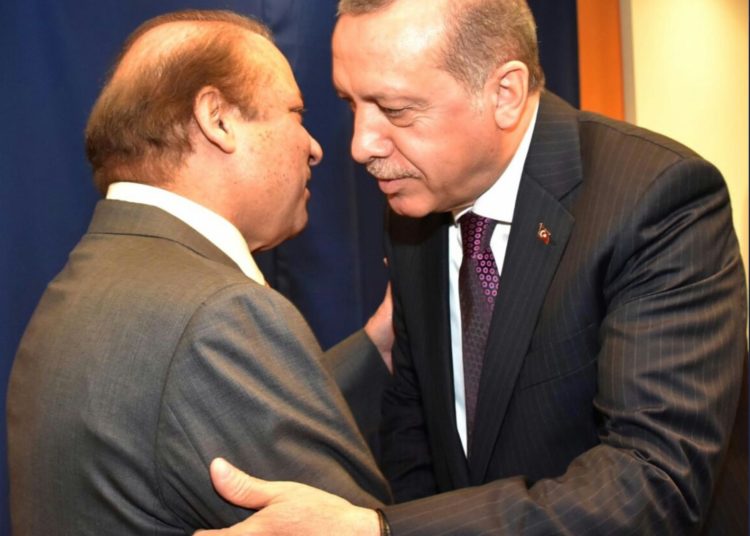Abdullah Bozkurt/Stockholm
In a flagrant violation of United Nations rules, the government of Pakistan illegally passed confidential information to Turkey about Turks who had sought protection status with the UN Refugee Agency (UNHCR) in Islamabad due to the risk of death, torture and ill-treatment if they were to be extradited to Turkey.
According to a secret memo drafted by Turkish Foreign Ministry diplomats, a copy of which was obtained by Nordic Monitor, Pakistani authorities secretly negotiated a deal with their Turkish counterparts in handing over Turks affiliated with the Gülen movement, a group that is highly critical of President Recep Tayyip Erdoğan on a range of issues from pervasive corruption in the government to Turkey’s aiding and abetting of armed jihadist groups.
“A list of 334 FETÖ [Turkish government acronym to refer to the Gülen movement] members and their families who applied for refugee status with the UNHCR Pakistan office has been provided [to us] by Pakistani authorities,” stated the memo.
UNHCR’s mandate requires strict confidentiality for asylum seekers. According to the guidelines posted on the UNHCR website, all UNHCR staff are under a duty to ensure the confidentiality of information received from or about asylum seekers and refugees, including the fact that an individual has registered or is in contact with UNHCR. The UN body also makes clear that UNHCR will not contact or share any information regarding the applicant with the country of origin.
From the secret Turkish government memo, it is clear that the UNHCR Islamabad office passed the confidential information to the Pakistani government, which in turn handed the list over to the Turkish Embassy.
As a result of sharing the information with Turkish authorities in violation of UN rules, all the people named in the UNHCR list faced criminal prosecution on fabricated charges of terrorism in Turkey because of their affiliation with the Gülen movement, which had been running one of Pakistan’s best-performing schools for decades in multiple provinces until their takeover by the Turkish government-run Maarif Foundation. The people targeted by the Turkish Embassy also faced unlawful asset seizure in Turkey, passport cancellation and denial of consular services, while their relatives and friends risked imprisonment over guilt by association, widely used by the Erdoğan government to punish critics, intimidate opponents and harass dissidents.
Secret Turkish Foreign Ministry memo details talks with Pakistani officials to target a civic group that is critical of the Turkish president:
The memo laid bare how secret talks between Turkey and Pakistan had continued for several years in order to victimize a civic group that had nothing to do with any violence or terrorism. The pressure started to build on the Pakistani government as early as in 2014 when Erdoğan declared war on the Gülen group in the aftermath of multi-billion dollar corruption investigations that incriminated then-Prime Minister Erdoğan and his family members. Erdoğan accused US-based Turkish Muslim scholar Fethullah Gülen of launching the investigations, a claim that Gülen denied and for which the government failed to present evidence.
In fact, by and large the same evidence was also used in US federal court for an Iran sanctions busting scheme that the Erdoğan government helped facilitate. Turkish state lender Halkbank Deputy General Manager Mehmet Hakan Atilla was convicted on multiple counts and served time in a US prison, while Erdoğan’s Economy Minister Zafer Çağlayan, also indicted in the same case, remained a fugitive. The case implicated Erdoğan as the man who authorized the scheme to help Iran move funds through Turkish banks using fictitious trade, gold trade and other means.
According to the memo, a deal was struck between Erdoğan and then-Pakistani Prime Minister Nawaz Sharif during a meeting in New York on the sidelines of the UN General Assembly that opened on September 20, 2016. During the meeting Sharif pledged that no new applications for establishing schools by Gülenists would be accepted and that the government had forced the ouster of four members of the board of the PakTurk schools and replaced them with loyalists.
Since the schools were very popular in Pakistan, with some 11,000 students enrolled, and employed 1,200 Pakistanis and 134 Turkish personnel, the Pakistani government informed the Turkish Embassy that it wanted to take over the schools and hand them over to Turkey in stages. The plan, devised by the government, was to not renew the residence permits of the Turkish teachers, use formal and informal tactics to force them to leave Pakistan, deny entry to those who wanted to return and reject asylum applications.

The pressure apparently worked as 44 people affiliated with the Gülen movement decided to leave the country along with their families in order to seek safety from the long arm of Erdoğan. Others bet on Pakistan’s courts to dispense justice and challenged the government’s arbitrary decisions. They were wrong. The memo clearly stated that Pakistani officials had privately assured Turkey that the people who remained in the country pending legal proceedings would be deported no matter the result of the legal challenges.
On July 11, 2016 Pakistan’s Foreign Ministry held an interagency meeting to coordinate actions against the Gülen people and informed Ankara that the people who had left Pakistan had grown to 92, while 266 still remained in the country.
Concerned that the Pakistani authorities would go along with Turkey’s demands and alarmed by the Interior Ministry’s Nov. 14 announcement that asked Turkish teachers to leave the country within three days, 81 families (345 people in total) filed for protection status with the UNHCR Islamabad office on November 24, 2016 in order to protect themselves from arbitrary deportation and maintain their legal status in Pakistan. That gave them up to a year’s legal residence in Pakistan pending the review of their applications with UNHCR with the possibility of a further extension.
In addition to releasing the names of the 334 Gülenists who filed for protection status with UNHCR to the Turkish Embassy, Pakistani authorities also handed over a separate list of 110 people who had departed Pakistan. Of these 110, 63 Gülenists had applications pending with UNHCR. Pakistan also said all those who had filed for protection status with UNHCR would be deported before the expiration of the one-year review period, which means Pakistan was willing to disregard its international commitments under the UN Conventions just to please President Erdoğan and help him pursue a global witch hunt against his critics.
According the memo, the Turkish government made an assessment that 284 people linked to the movement were still in Pakistan at the time.
On August 2, 2017 Turkish Ambassador Sadık Babür Girgin met with Shahid Khaqan Abbasi, the then-Pakistani prime minister, to inform him in no uncertain terms that his government’s expectations had fallen short. In his meetings with deputy foreign minister and International Organizations Department Director Aslam Khan, the Turkish ambassador continued to air his grievances, saying that the Turkish demands were not fully met and warning of consequences if UNHCR extended the protective status for applicants from the Gülen movement. Khan assured the Turkish ambassador that no extension would be given to UNHCR and that Pakistan’s traditional position with regards to Turkey had not changed.

In the end, Turkey’s threats to Pakistan yielded results. On September 27, 2017 plainclothes police officers from Pakistan’s Counterterrorism Department (CTD) kidnapped former director of the PakTurk schools Mesut Kaçmaz along with his wife Meral and two daughters, 17 and 15 at the time, in a late-night raid on his Lahore apartment. He and his family were locked up near Fortress Stadium in Lahore, close to a military base.
The CTD eventually handed them over to Turkey’s National Intelligence Organization (MIT). Although Kaçmaz and the family were under the protection of UNHCR with an asylum seeker certificate and a ruling by the Lahore High Court (LHC) that barred the government from deporting him pending legal proceedings, Kaçmaz and his family were unlawfully turned over to Turkish intelligence officials on October 14, 2017.
The beatings and abuse started on board the plane, with Mesut battered by Turkish officers in front of his wife and two daughters. After landing in Istanbul, he and his wife were separated, detained, arrested and subjected to further torture and ill-treatment in detention and prison. They were threatened with the murder of their daughters unless they sign prepared statements that would incriminate them.
Kaçmaz had been involved in the PakTurk schools as an administrator for many years, and he was even featured in a New York Times story by journalist Sabrina Tavernise on May 4, 2008. The article mentioned how Gülen movement-affiliated Turkish schools had a positive effect on Pakistan, a country where armed radical groups and jihadist madrasas were operating in Pakistani-Afghan border provinces.
The PakTurk schools are now under the management of Turkey’s Maarif Foundation, run by political Islamists who have links to radical groups.












